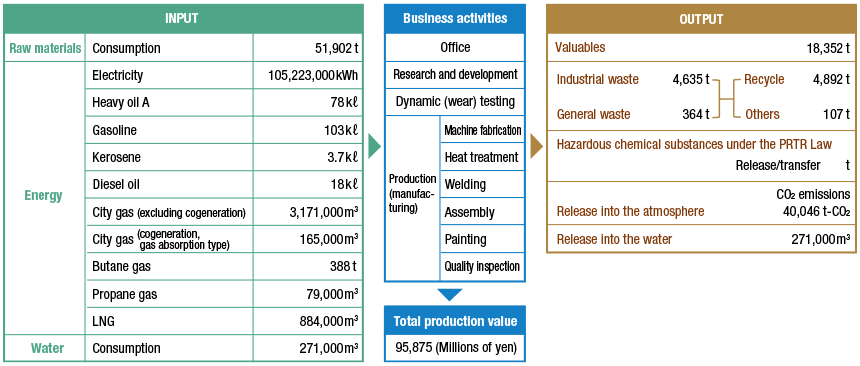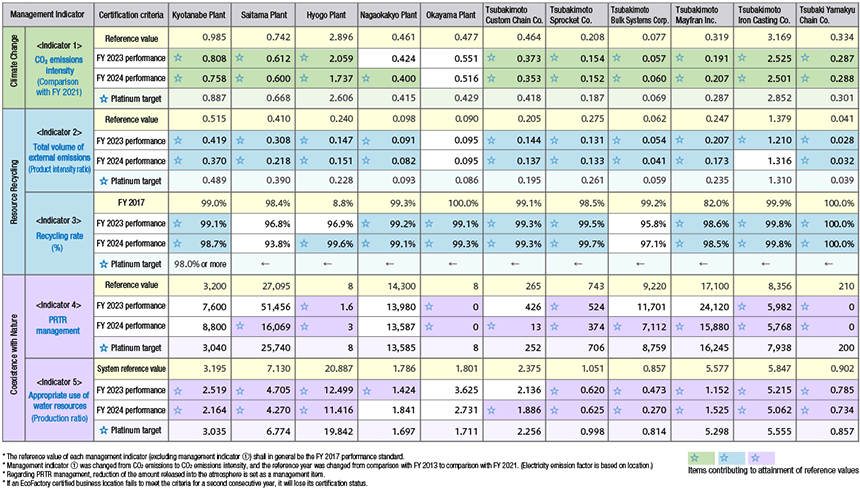Environmental Performance Data (FY 2024)
Input and Output
The Tsubaki Group understands the impact on the environment of its business activities and strives to reduce its environmental impact. The results of the efforts of our 11 business sites in Japan in FY 2024, are presented below.

Implemented business sites:
Tsubakimoto Chain (Kyotanabe Plant, Saitama Plant, Hyogo Plant, Nagaokakyo Plant, and Okayama Plant)
Tsubakimoto Custom Chain, Tsubakimoto Sprocket, Tsubakimoto Bulk Systems, Tsubakimoto Mayfran, Tsubakimoto Iron Casting, and Tsubaki Yamakyu Chain
Implemented period:
April 1, 2024 to March 31, 2025
EcoFactory Certification System
The Group recognizes that responding to the threat of climate change (by reducing CO2 emissions), acknowledged as an urgent environmental challenge, is a sufficient condition for an environmentally advanced company. It also recognizes that waste reduction, appropriate management of hazardous chemical substances, and other resource recycling efforts—along with the pursuit of greater harmony with nature through greening and water conservation—are necessary conditions for an environmentally advanced company.
Against this backdrop, in FY 2018 we established the EcoFactory Certification System for our business sites in Japan. This initiative encompasses management indicators and milestones for each of the three theme areas—climate change, resource recycling, and maintaining harmony with nature—with the goal of steadily achieving our long-term environmental targets for the year 2030. Upon obtaining SBT certification in June 2023, we changed the baseline year for our climate change management indicators from FY 2013 to FY 2021. We also began measuring by intensity criteria instead of total emissions volume so that we can more accurately evaluate the results of our autonomous measures to reduce emissions.
FY 2024 EcoFactory certified plants
- Diamond Rating (★★★): Tsubakimoto Chain (Hyogo Plant)
- Sapphire Rating (★★): Tsubakimoto Chain (Kyotanabe Plant), Tsubakimoto Custom Chain, Tsubakimoto Mayfran, Tsubakimoto Iron Casting, and Tsubakimoto Sprocket
- Platinum Rating (★): Tsubaki Yamakyu Chain, Tsubakimoto Chain (Nagaokakyo Plant)
EcoFactory Certification Criteria
| Theme | Management Indicator | Certification Criteria | |||
|---|---|---|---|---|---|
| ★ | ★★ | ★★★ | |||
| Platinum | Sapphire | Diamond | |||
| Climate Change | (1) | CO2 emission intensity (compared to FY 2021) | 10% reduction | 15% reduction | 30% reduction |
| Resource Recycling | (2) | Total external emissions (per unit of production compared to FY 2017) |
5% reduction | 10% reduction | 15% reduction |
| (3) | Total disposal/recycling rate | More than 98% | More than 98.5% | More than 99% | |
| Coexistence with Nature | (4) | Reduction in atmospheric emissions of substances subject to PRTR (compared to FY 2017) |
- | 5% reduction | 10% reduction |
| (5) | Improved greening rate of plants | - | At least 2% pt of the standard for the relevant municipality | At least 4% pt of the standard for the relevant municipality | |
| (6) | Effective use of water resources | - | 5% reduction | 10% reduction | |
[The following must be met as necessary conditions for certification]
- No conflict with environmental laws and ordinances
- No indication of Category A in the external review of ISO 14001
- No environment-related complaints from communities where business sites are located, or any such complaints have been resolved
FY 2024 Environmental Data for Business Sites in Japan
The environmental data for domestic business sites based on the EcoFactory Certification target items are as follows:



